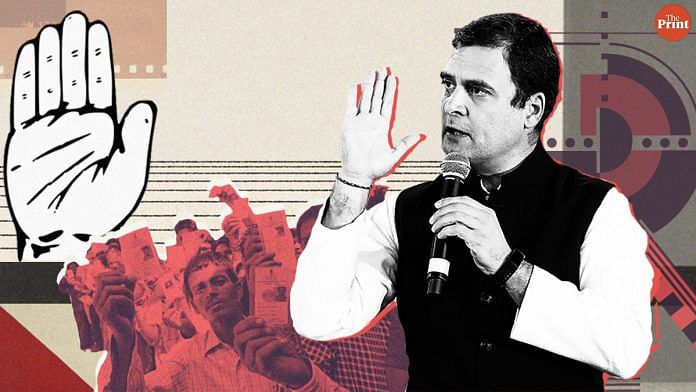Congress president Rahul Gandhi Monday pledged to give Rs 72,000 a year to the country’s poorest families if the Congress is voted to power in the 2019 Lok Sabha elections. Gandhi called his minimum income support scheme a “final assault on poverty”.
ThePrint asks: Rahul Gandhi’s Rs 72,000 income pledge: Are populist freebies the only way to win elections?
Doling out freebies without proper planning would lead to cut in productive investment & rise in borrowing costs
 Radhika Pandey
Radhika Pandey
Economist, NIPFP
The Congress party has announced a minimum income guarantee of Rs 72,000 per annum to the poorest 20 per cent families in India. The party had announced freebies in the form of farm loan waivers prior to state elections as well. By design, minimum income guarantee is the least distortionary way of supporting the targeted poor, however, the timing of the announcement suggests that it is a populist measure designed to garner votes.
The implementation of such a measure is fraught with serious difficulties. First, the question of identifying the 20 per cent of the poorest is difficult and cumbersome. The criteria for identifying poor households would need to be set. Second, resource generation for the implementation of this scheme would need to be worked out. Perhaps the implementation would require rationalisation of subsidies, as some of these schemes benefit the not so poor. Rethinking would also be required on some of the existing tax concessions. All these are politically difficult questions. In the absence of these tough decisions, the practice of doling out freebies would lead to cut in productive investment and rise in borrowing costs – all of which would hurt the poor in the long run. These are legitimate questions in the minds of people and it would be desirable to have a detailed analysis of the pros and cons of such a move.
Not income support but reforms that help poor enter the workforce will be a successful economic model
 Himanshu
Himanshu
Associate professor of Economics, JNU
There are primarily two major problems with this income support. First is a conceptual problem. The poor need to be given jobs to make them active participants in the workforce. Reforms are meant to help the poor earn a livelihood and include them in the labour force. That would be a successful economic model. All those who are willing to work and are in a position to work should be given the opportunity to live a life of dignity by earning their living.
The second problem is of implementation. How would one determine who are the 20 per cent poorest Indians? More importantly, how would they determine their family incomes? There are no mechanisms in place. Not only will this scheme run into bureaucratic hurdles, it doesn’t account for fluctuating incomes either. What happens when somebody with a secure job doesn’t have the job anymore? In professions like agriculture, farmers don’t have an income for many months until they harvest their crop and earn money.
The poor would any day prefer to earn a dignified living through work opportunities than live on these support plans.
Also read: Why vote buying doesn’t work in India
We must cheer the prospect of the election debate shifting to issues that matter to poor Indians
 Narendar Pani
Narendar Pani
Professor, National Institute of Advanced Studies
The minimum income guarantee promised by Rahul Gandhi brings a much-needed shift in the political debate on the uncertainties facing the poor in a liberalised India.
Unlike the much-touted Universal Basic Income, a minimum income guarantee does not offer the same financial support to an ultra-rich as it does to the absolute poor. It also provides a link between support to the poor and their employment potential.
A strategy that offers employment opportunities to the poor would raise the income possibilities of their families to levels that are much closer to the guaranteed income, if not above it. The amount the government would have to pay to bring the income of all poor families up to the guaranteed level would then be much less.
Much would, of course, depend on how the poor are identified and how accurately the government estimates the distance between the poverty level and the minimum guaranteed income.
If the government makes the usual overestimation for political convenience, the cost of the scheme will go up to a level where it can hurt allocations for other critical areas like health, education and food security.
But despite these risks, there is reason to cheer the prospect of the election debate shifting, even momentarily, to issues that can make a significant difference to the lives of poor Indians.
Any income plan must be complemented by building access to basic services via public provisioning
 Deepanshu Mohan
Deepanshu Mohan
Assistant Professor of Economics, OP Jindal Global University
Rahul Gandhi is offering Rs 72,000 per year as minimum income support to “poor” households – those with less than Rs 12,000 monthly income.
With limited information on the plan, I am sceptical about the scheme for following reasons.
First, in India, it is problematic to see poverty – in its absolute sense – as an explicit deprivation of income alone. It is rather a function of deprived capabilities (in access to basic social and economic services). Any basic income plan that, in its valuation, does not accommodate for basic costs to healthcare (currently with 65-70% as out-of-pocket expense), education, housing and others will quickly run into the problem of being too little for too few. Building access to basic services via public provisioning must be complemented with this.
Second, from a fiscal lens, any basic income plan can remain most feasible if, and only if, other means-based transfers (say, subsidies on food, fuel) are subsumed in it, or substituted with fiscal cost of affording such plan for the target group. From a revenue side too, in a highly regressive union tax system (with 65:35 ratio of indirect-direct tax base), maintaining fiscal discipline and paying for other subsidies are extremely onerous for the state.
Lastly, a strong assumption behind such plans presupposes that money allocated is actually spent for its intended purpose. This is rarely true though. A massive bureaucracy and paper-work create a problem of sludge, adding to high social and economic costs. There are, of course, gender implications (at an intra-household level) on how the basic income is actually spent by households that are entitled to receive free-cash without any conditions or monitoring mechanism. Hence, one needs more details and clarity.
From farm loan waivers to basic income support, every poll season witnesses a bidding war
 Achyut Mishra
Achyut Mishra
Journalist, ThePrint
Ever since Indira Gandhi made populism popular in Indian politics, leaders across the spectrum have found it difficult not to succumb to the temptation. From farm loan waivers to basic income support, a bidding war starts in India during the poll season with scant regard for the long-term consequences of such actions.
Rahul Gandhi’s announcement of minimum income support is just one more addition to this list. As an abstract idea, a minimum income support sounds great. After all, who doesn’t want to remove poverty and ensure a more equitable society? But not all noble-sounding ideas can be translated into a tenable reality.
It’s generally politically difficult to implement something new at the cost of existing subsidies, many of which already suffer from leakages. And if this scheme is implemented in addition to the existing plans, it will only make the fiscal situation worse. The government is already finding it difficult to stay within its fiscal deficit target of 3.4 per cent. As a likely outcome, the government may transfer some of the financial resources presently allocated to other critical areas like infrastructure to this scheme. This will only hurt the poor more in the long run as most wealth redistribution policies generally do.
By Fatima Khan, journalist at ThePrint.




Now to those bleeding hearts who are crying about the financing of such an arrangement – the easiest financing option is that the top 10% families sacrifice about Rs. 144K per annum for the bottom 20% families so that the bottom 20% can get INR 72K per annum for a few years till the bottom 20% gets to feed themselves, educate their children and starts to become more self-sufficient. It would not be more than 20 years. Is that a big deal in a country where we have more than one multi-billionaires? It is a ‘sacrifice’ that would not hurt the top 10% or jeopardise the future of their children. Combine it with the public investment (and not make education so expensive that even an upper middle income fellow has to take loan to educate a child – not even two children) in quality of education, better sanitation in slums and poor population areas (not the redevelopment schemes of different coloured politicians) and public investment in primary health care (not PPPs of Gujarat and Punjab kind), we will be done in less than a generation. I have seen that happen and that is what businessmen like Mr Murthy have been telling us that they come from very middle income families and have become billionaires in less than a generation. We don’t have to worry about the poor becoming even millionaire. it is enough if they can feed and educate their children and remain healthy. We can achieve this, if our politicians and their cronies stop stealing and we stop worshiping ‘thugs’ who are pretending to be reincarnation of our gods.
15 lakh in every body’s account. Modi couldn’t fulfill it and he will be thrown out this time. If Rahul Gandhi cannot fulfill his promise he will be thrown out the next time. But the initial reactions to the promise of 72000 per year suggest that now people are afraid that Rahul Gandhi will definitely implement it. I welcome the promise. That money will be used by the poorest for food and education. Will it not give a boost to the economy?
Absolutely, Govind. It is indeed expected to help the economy grow. The poor will definitely spend on basic needs. Since the government does not produce goods and services for various basic needs, the spending will, of course, help private enterprise as well as our fat cat corporate honchos who have no problem in lobbying with the government for producer subsidies – SEZ has turned out to be one of the biggest rackets of all times. The same fat cats lobby for tax breaks of all kinds, but have problems if the government offers a helping hand for the poor. The idea that people will stop working is the dumbest – how can some one who does not have work (or has no chance of getting work – unemployment at the highest level in 45 years – refuse to work and become lazy? Our biggest failure has been that the large corporates have enjoyed subsidies and have created low quality jobs, at best. The fact is that the large corporates don’t do a lot of work themselves, they outsource and it is MSMEs who do work and create jobs. A large number of low value-adding government jobs have also been outsourced through contractors – who are obviously influential people themselves. our educated become consultants to the government and get paid hefty fees for saying subsidies are bad.
Some of our professors and thinkers have themselves benefitted from subsidies, as they have studied in publicly funded institutions. They would still argue that the poor don’t need the helping hand. I find that to be sickening. I can have the subsidy but not the ones who have no chance in life.
our educated elite and businessmen have become so unthinking that their arguments have become completely predictable. I can save Jet Airways by using public sector funds and public money, but I must not help people who are so disadvantaged that they can’t even afford to feed themselves or their families.
It is like saying that if you give free money, I will build a great business. But if you give to the poor, he/she will become lazy. As if the rich don’t become lazy, if they get free money.
People like Mr Jaitley or Mr Modi will not relate to a person’s life. Mr Jaitley is a successful lawyers after having studied at a publicly funded university and Mr. Modi does videos in fancy dress – exercising in a publicly funded large property in the middle of national capital. The poor must live in slums and their children should die in those slums with water-borne or airborne diseases. Same Mr Modi will spend INR 5000 crore+ on self-promotion and Air India will do ads with his face on the boarding pass, funded with public money.
We will all be told that India will become great now. How, when you have starving people, who have no chance in their life? Ideology must win over empathy, dialogues must win over reality, lies must win over truth – that is the New India where the well-fed intellectuals and darbari media will tell us people will become lazy if they get a chance to feed themselves – sickening at best. Is it not?
On a more somber note, the political class seems to be giving up on unlocking India’s economic potential. If job creation is dismal – in fact, hugely negative – we will offer tiny quotas by way of reservation. If high growth is not pulling ten to fifteen million Indians out of poverty each year, we will go for direct income transfers. Inevitably, this will impact India’s place in the world. We will be bracketed with Pakistan and Bangladesh, not China.
In terms of ordnance, this is Spice 2000. In gentler times, we would have said, Setting the cat among the pigeons. All the channels are covering it. How accurate the GPS coordinates are, how the scheme will be paid for, woh sab baad ki baatein hain. 2. In 1991, Shri Murli Deora, who stood for the Lok Sabha from South Bombay, promised the tenants staying in dilapidated buildings that they would become owners by paying 100 months’ rent to their landlords. The constitutional validity of that scheme has still not been ruled upon by the apex court, but he won the election. In 1995, the Shiv Sena promised four million slum dwellers in Bombay that they would get free houses. It captured Mantralaya, although the scheme for slum redevelopment continues to meander along like a river in its floodplain. 3. Criticism of this promise will have to be muted, nuanced, because the incumbent was equally expansive on the campaign trail five years ago.